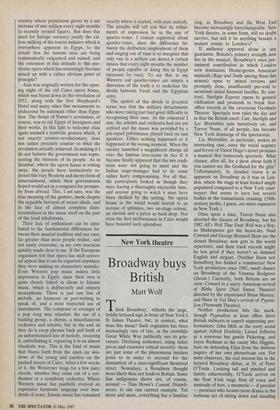Music
One in a million
Peter Phillips
he recent production of Aida in Luxor, Upper Egypt, has presented the world with an unusual spectacle in a number of ways. The setting of it in the Luxor Temple (not, incidentally, the more famous temple of Karnak which is just up the road and which was featured in the film of Death on the Nile) was ideal from a purely visual point of view, and the detachments of Egyptian troops who joined in lent the performance some agreeable local colour. But I wonder very much what the Egyptian government thought they were doing in allowing the staging of this egregiously extravagant and very foreign circus. The reason, of course, was to attract tourist money, and one might say that that was fair enough in a
T
country whose population grows by a net increase of one million every eight months (a recently revised figure). But does this need for foreign currency justify the cal- lous milking of the tourist industry which is everywhere apparent in Egypt, to the extent that the famous sites are being systematically vulgarised and ruined, and the extension of this attitude to this par- ticular opera which has unwittingly become mixed up with a rather obvious point of principle?
Aida was originally written for the open- ing night of the old Cairo opera house, which was burnt down in the revolution of 1952, along with the first Shepheard's Hotel and many other fine monuments to endeavour by nationals other than Egyp- tian. The thrust of Nasser's revolution, of course, was to rid Egypt of foreigners and their works. In this light to welcome Aida again seemed a symbolic gesture which, if not exactly counter-revolutionary, does run rather precisely counter to what the revolution actually achieved. In making it I do not believe the government was repre- senting the interests of its people. As in Istanbul, where the opera house is rotting away, the people have instinctively re- jected this very Western and showy form of entertainment, which their governments hoped would act as a vanguard for prosper- ity from abroad. This, I am sure, was the true meaning of the gesture, made despite the arguable betrayal of recent ideals, and in the face of almost complete disin- terestedness in the music itself on the part of the local inhabitants.
Their lack of enthusiasm can be attri- buted to the fundamental differences be- tween their musical tradition and our own: far greater than most people realise, and not easily overcome, as my own reactions quickly made clear to me. If the European organisers felt that opera has such univer- sal appeal that it can be exported anywhere they were making an elementary mistake. Even Western pop music makes little impression in Egypt, since their own is quite closely linked in idiom to Islamic music, which is deliberately and entirely monophonic. There is just one line of melody, no harmony or part-writing to speak of, and a most restricted use of instruments. The composer or arranger of a pop song may stipulate the use of a backing group, a chorus, a miscellaneous orchestra and soloists, but in the end all they do is swop phrases back and forth of an unharmonised line of melody, rescoring it, embellishing it, repeating it in an almost ritualistic way. This is the kind of music that blares forth from the open car win- dows of the young and careless on the packed streets of Cairo. After a few weeks of it, the Westerner longs for a few juicy chords, whether they come out of a syn- thesiser or a symphony orchestra. Where Western music has painfully evolved an expressive harmonic language over hun- dreds of years, Islamic music has remained exactly where it started, with pure melody. The pundits will tell you that its refine- ments of expression lie in the use of quarter-tones. I remain equivocal about quarter-tones, since the difference be- tween the deliberate employment of them and singing out of tune is so marginal that only one in a million can detect it (which means that every eight months the number of people capable of doing this in Egypt increases by one). To say that to my Western ear quarter-tones are simply a distortion of the truth is to underline the divide between Verdi and the Egyptian army.
The upshot of this divide in practical terms was that the military detachments who were taking part had great difficulty in recognising their cues. At the rehearsal I saw, the soloists and orchestra had not yet arrived and the music was provided by a pre-taped peformance played back on vast speakers. Either nothing happened or it happened at the wrong moment. When the cavalry launched a magnificent charge all over the famous love-scene in Act II it became finally apparent that the two tradi- tions were not going to meet and the Italian stage-manager had to do some rather hasty compromising. For all that, the participants looked as though they were having a thoroughly enjoyable time, and anyone going to watch it must have been thrilled by the setting. No opera house in the world would stretch to an avenue of sphinxes, two on-stage colossi, an obelisk and a pylon as back-drop. Not even the first performance in Cairo would have boasted such splendour.





















































 Previous page
Previous page